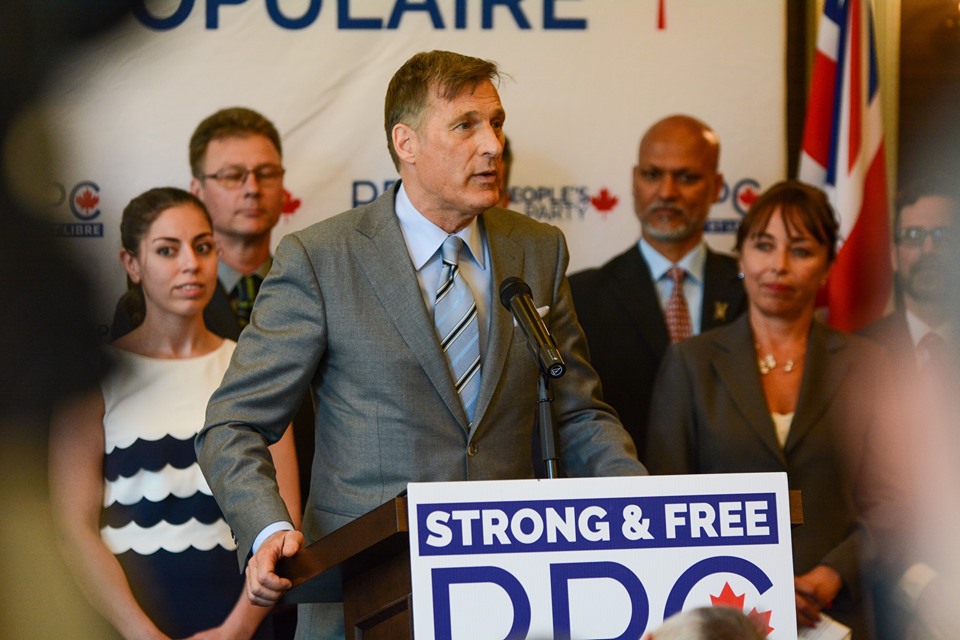
OTTAWA — People’s Party of Canada Leader Maxime Bernier secured an invitation Monday to two official leaders’ debates in October.
The Leaders’ Debates Commission, formed by the federal government to organize the two debates, said Bernier’s party has a “legitimate” chance of electing members in more than one seat and he therefore qualifies to participate, a decision that drew immediate objections from the Conservatives and New Democrats.
Bernier has said that participating in the debates is crucial to getting his new party’s message in front of potentially receptive voters.
He had previously been denied the chance to debate because the commission found his party did not meet at least two of three criteria for participation:
— having at least one MP elected as a member of that party;
— running candidates in at least 90 per cent of Canada’s 338 ridings; and/or
— having won at least four per cent of the popular vote in the last election or having a legitimate chance at electing candidates
Bernier is the party’s lone MP but he was elected as a Conservative, forming the People’s Party after losing the leadership to Andrew Scheer and ultimately concluding that there’s little difference between the Tories and the Liberals.
The People’s Party is running candidates in more than 90 per cent of Canada’s ridings. But the debates commission initially ruled that the party didn’t stand a legitimate shot at electing more than one candidate and told Bernier he was out.
After giving the party more time to provide further evidence and to bring the decision closer to the date of the actual election, debates commissioner and former governor general David Johnston said the party does in fact have a “reasonable chance” at winning multiple seats.
“That was the right decision,” Bernier said in a video posted to Twitter soon after the news.
Michel Cormier, executive director for the debates commission, expressed confidence in the decision-making process.
“Under the leadership of Mr. Johnston, it’s been a very reasoned and detailed and deliberate process to make sure we come to the right decision. Because it’s a decision of importance,” Cormier said in an interview.
Johnston noted in a statement made public Monday the decision-making process for determining inclusion was “complex” and required interpretation of what was meant by “legitimate chance,” and how to consider multiple factors — some of which were quantifiable and some which were not.
Johnston also said it was difficult to predict the chance of winning in this early stage, but based on past trends, he concluded “it is possible that the PPC’s support may change positively over the course of the upcoming campaign.”
On the question of more recent polling data, the debates commission worked with the research firm EKOS to survey four ridings the PPC flagged as having prominent candidates with a chance of victory.
“We decided not to poll people’s general voting intentions of other parties” so the commission could isolate the level of potential support for the People’s Party, Cormier said.
“We’re not predicting victory here, we’re just trying to measure whether they have a reasonable chance,” he said.
The resulting polling found substantial minorities of people in those four ridings who said it was either “possible, likely, or certain” they would vote for the PPC candidate.
The level of potential support broke down to 34.1 per cent of respondents in Nipissing-Timiskaming, 29.9 per cent in Etobicoke North and 25.9 per cent in Pickering-Uxbridge, all in Ontario, and 24.5 per cent in Charleswood-St. James-Assiniboia-Headingly, in Manitoba.
The commission also asked polling firm Nanos Research for an opinion on what level of support was needed to win a riding. Based on past electoral results, Nanos responded that parties had a chance of winning a seat if they garnered more than 25-per-cent support.
“Upon review of this opinion, I conclude that where more than one of four voters in a riding considers voting for a party, that party has a reasonable chance to elect its candidate,” Johnston said.
The debates commissioner also took into account Bernier’s personal popularity in his own riding of Beauce, Que., as well as a submission from the Conservatives that no party has won a seat with national support under three per cent since 1949.
The Conservatives accused Johnston of bias against them. Some Tories have accused EKOS pollster Frank Graves of being anti-Conservative as well, which he’s denied.
“It’s no big surprise that Justin Trudeau’s hand-picked debate panel used a Liberal-friendly pollster who attacks Andrew Scheer to ultimately justify Mr. Bernier’s attendance at the debate,” press secretary Daniel Schow said by email. “Trudeau has been stacking the deck for months, using the power of his office to tilt the playing field in his favour for this election.”
The New Democrats objected to Bernier’s inclusion for a different reason.
“The rise of extremism, hate speech and white supremacy is a real threat to our country. Leaders have a responsibility to not feed this problem, but this is exactly what Maxime Bernier is doing,” the NDP said in a statement.
“We think this was the wrong decision. The decision has been made independently, so there is nothing else that we can do, but we hope other leaders will join us in denouncing any hate speech from Maxime Bernier.”
The Liberals also offered a statement: “Our Liberal team appointed former governor general, the Right Honourable David Johnston, to lead the new debate commission so decisions on participation for the two official debates would be made independently. We look forward to continuing to share our positive, forward-looking and inclusive vision with Canadians.”
Bernier will join the leaders of the Liberals, Conservatives, NDP, Bloc Quebecois and Greens in two debates: one in English on Oct. 7 and a French-language debate Oct. 10.